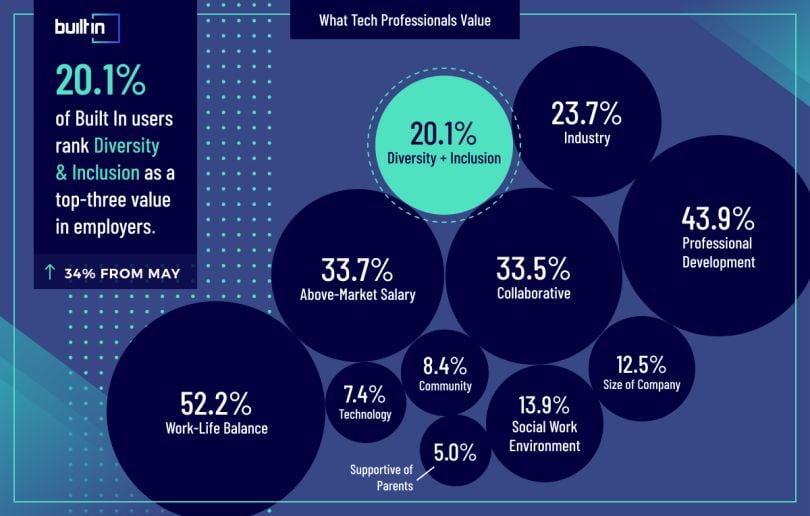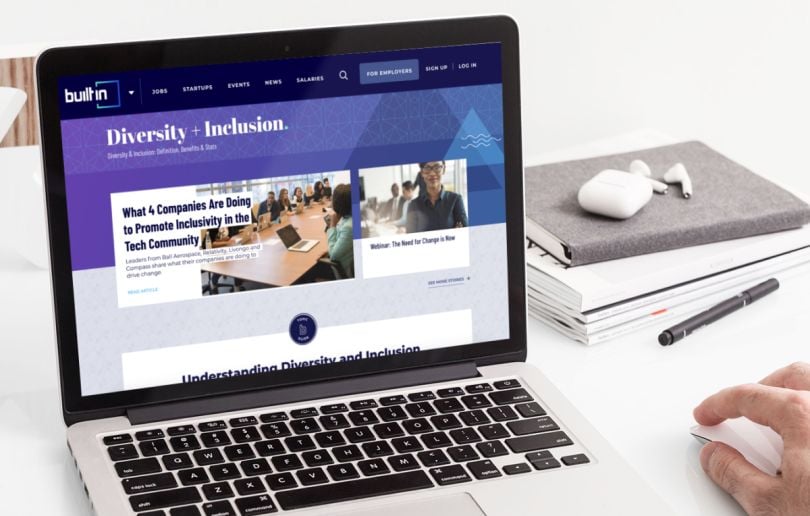Tech’s diversity problems have been debated for decades, but the Black Lives Matter movement has prompted a new reckoning within the tech workforce. In the past few months alone, employee activism has driven tech companies to rewrite policies, establish new oversight mechanisms, and in some cases take entire products or features offline.
This desire for accountability is reflected in our user data. The percentage of new Built In users who identified diversity and inclusion as a top-three value in employers grew 34 percent from May to June, and it continues to outrank factors like company size and tech stack, which have declined in importance over the past several months.
Over the past several months, we’ve spoken to a diverse range of experts — in fields ranging from engineering to data science, sales and marketing — to better understand how factors like race, gender and ability intersect with their work. These were some of the biggest themes to emerge, as well as some concrete actions we can all take to address them.

A Lack of Diversity Hurts Our Colleagues, Our Communities and Our End Users
Black women remain underrepresented in engineering, due to biased hiring processes and managers who undermine diversity efforts. These problems persist throughout an employee’s tenure, which is why advocates stress the value of establishing employee resource groups. Such groups can bring about overdue cultural change, like the removal of racist terms like “master” and “slave” from codebases.
Diversity conversations often focus on technical roles, but bias affects employees across every function. Black marketers may find themselves labeled as “aggressive” for weighing in in the same way their white colleagues do. Sales managers often fail to recognize the ways in which Black reps confront bias from clients and colleagues alike. And in many cases, companies lack fair, consistently applied performance metrics.
Bias Goes Beyond Explicit Discrimination
Bias shows up in job listings too. Hiring sales managers should avoid jargon-filled job postings, which can deter qualified candidates from underrepresented communities. And engineering leads should avoid gendered wording and coded ageism, such as “fast-moving.” Companies should also rethink unpaid internships, which reinforce inequities.
Beyond the entry level, change will require significant financial investment in developing more diverse leaders.
We Can Make Our Products More Inclusive
Diverse teams are key to building more inclusive products, but we can all take steps to move the industry in the right direction. Developers and data teams can default to not collecting gender identity information when building applications. And UX designers can diversify language options during user testing and take advantage of OS-standard accessibility APIs, such as voice command and playback.
Broader conversations around ethics are also ramping up in open-source communities, where pushes for behavioral guidelines have given birth to helpful drag-and-drop governance tools. That’s the kind of motivated self-reflection we can all embrace.

Do You Think the Tech Industry Is Inclusive?
We want to hear from you.
The first step in making the technology industry more diverse, equitable and inclusive is assessing where it stands. To do that, we ask that you complete this 10-minute survey, which asks about your own experiences as a tech professional.
Your answers will remain anonymous and the data we gather will help us create a baseline for the state of DEI in tech. As a thank you, provide your email address at the end of the survey to get early access to the report’s findings.



